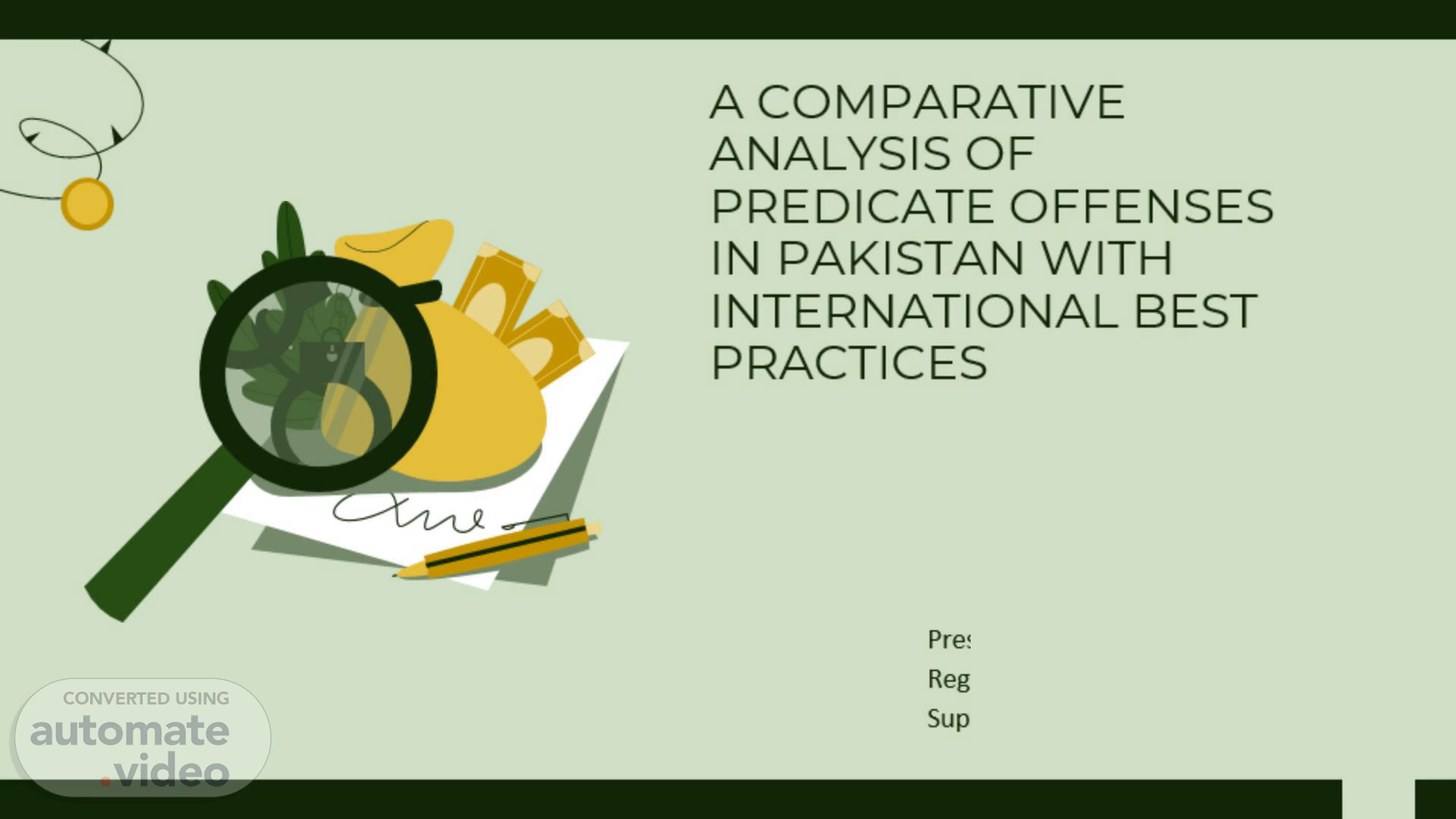
A COMPARATIVE ANALYSIS OF PREDICATE OFFENSES IN PAKISTAN WITH INTERNATIONAL BEST PRACTICES
Scene 1 (0s)
A COMPARATIVE ANALYSIS OF PREDICATE OFFENSES IN PAKISTAN WITH INTERNATIONAL BEST PRACTICES.
Scene 2 (12s)
Introduction. Predicate offenses are a component of a larger crime, generating monetary proceeds and facilitating severe criminal activity. They are the first crime in a chain of another crime, such as money laundering. Predicate offenses enable or facilitate larger crimes, including money laundering. International cooperation is crucial to combat predicate offenses. Ensuring global information sharing and tracking illegal money flows is a priority for FATF and UNODC..
Scene 3 (33s)
Thesis Statement :. While predicate offenses are crucial in combating financial crimes, their implementation requires refinement to address unwarranted interference, safeguard individual person rights, and improve legal framework..
Scene 4 (45s)
Research Questions. 1. What is the effectiveness of including tax evasion as a predicate offense in Pakistan's Anti-Money Laundering (AML) framework in preventing money laundering, and what are the challenges and limitations in implementing this provision? 2. What is the alignment of Pakistan's legal framework for addressing predicate offenses, including tax evasion, with international best practices, and what lessons can be learned from a comparative analysis with countries like India and the UK to strengthen Pakistan's AML framework?.
Scene 5 (1m 7s)
Methodology & Objective. A comparative analysis methodology is employed to evaluate Pakistan's AML framework against international benchmarks This includes analyzing legal frameworks, enforcement mechanisms, and case studies such as the Panama Papers and Nirav Modi case to identify gaps and propose improvements The primary objective of this research is to critically analyze predicate offenses tied to money laundering and propose reforms aligned with international standards This research aims to address gaps in Pakistan's Anti-Money Laundering Act and recommend strategies to strengthen the country's AML regime It also seeks to improve governance and safeguard economic integrity.
Scene 6 (1m 32s)
Legal Framework. The global frameworks for Anti-Money Laundering (AML) and Counter-Terrorism Financing (CTF) are subject to various national and international laws In Pakistan, predicate offenses are linked to AML under the Anti-Money Laundering Act 2010, but these laws often fall short of aligning with international standards Internationally, predicate offenses are addressed through frameworks like FATF Recommendations and EU Directives The purpose of the legal framework is to establish clear rules, ensure compliance with international standards, and prevent financial crimes The goal is to align Pakistan's laws with international standards and strengthen its AML regime The Anti-Money Laundering Act (AMLA) 2010 criminalizes the acquisition and use of property derived from criminal activities However, it lacks provisions for emerging offenses like cybercrime and environmental crimes Weak inter-agency coordination and political interference further hinder its effectiveness.
Scene 7 (2m 6s)
Research Gaps. Enforcement of laws dealing with predicate offenses (crimes that precede money laundering) is inadequate, particularly in Pakistan. Lack of standardized definitions and categories for predicate offenses hinders international cooperation and effective prosecution. Gaps in identifying and prosecuting predicate offenses persist in Pakistan, despite efforts to enhance compliance with FATF requirements..
Scene 8 (2m 23s)
Comparative Analysis. Pakistan India UK The Anti-Money Laundering Act (AMLA) 2010 has a multi-agency approach, leading to coordination challenges and criticized for political interference, insufficient capacity, and weak inter-agency communication. The Prevention of Money Laundering Act (PMLA) 2002 has a centralized approach, effective in securing convictions and recovering proceeds of crime, with a focus on technology integration and streamlined enforcement mechanisms. The Proceeds of Crime Act (POCA) 2002 has a sophisticated and proactive approach, emphasizing international cooperation, transparency in beneficial ownership, and efficient asset recovery and prosecution..
Scene 9 (2m 48s)
Case Studies. Panama Papers Case: A massive leak of financial documents in 2016 exposed offshore companies linked to powerful people worldwide. Luxury properties in London owned by Nawaz Sharif's children were allegedly purchased through undisclosed means. Tax evasion and money laundering suspicions arose, highlighting Pakistan's lack of robust asset recovery framework. Corruption and tax evasion were the predicate offenses. Pakistan's Anti-Money Laundering Act (AMLA) 2010 was criticized for its ineffective implementation..
Scene 10 (3m 51s)
Recommendations and Conclusion. Pakistan needs to strengthen its laws to effectively tackle predicate offenses like corruption, tax evasion, and money laundering. The country should update its legal framework to include new crimes, ensure stronger enforcement, and provide clearer guidelines for investigation and prosecution. A central agency should be established to investigate and prosecute predicate offenses, and work with international authorities to recover stolen assets and prevent financial crimes..
Scene 11 (4m 12s)
Thanks !.